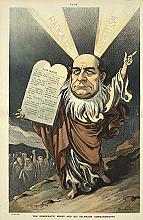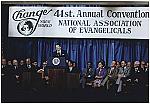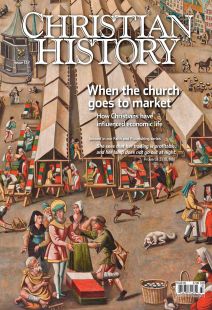Money Matters: Recommended resources CH 137
Books
Read about wealth and debt in the early church in Craig Blomberg, Neither Poverty Nor Riches (2000); Justo González, Faith and Wealth (2002); Daniel Caner, Wandering, Begging Monks (2002); Angeliki Laiou and Cécile Morrisson, The Byzantine Economy (2007); Ben Witherington III, Jesus and Money (2010); and David Graber, Debt: The First 5,000 Years (2014).
To learn more about early church philanthropy, look at Gildas Hamel, Poverty and Charity in Roman Palestine (1990); Demetrios Constantelos, Byzantine Philanthropy and Social Welfare (1991); Susan Holman, The Hungry Are Dying (2001); Peter Brown, Poverty and Leadership in the Later Roman Empire (2002); Richard Finn, Almsgiving in the Later Roman Empire (2006); and Susan Wessel, Passion and Compassion in Early Christianity (2016).
On the creation and uses of wealth in the Middle Ages, consult Kathryn Reyerson, Business, Banking, and Finance in Medieval Montpellier (1985); Jacques Le Goff, Your Money or Your Life (1988); Diana Wood, Medieval Economic Thought (2002); James Davis, Medieval Market Morality (2011); and Giles Gasper and Svein Gullbekk, eds., Money and the Church in Medieval Europe, 1000–1200 (2015). A good history of the Templars is Edward Burnam, Knights of God (1990).
For the Reformation era, consult Marjorie Grice-Hutchinson, The School of Salamanca (1952) and Early Economic Thought in Spain, 1177–1740 (1978); Gustaf Wingren, Luther on Vocation (1957); D. Michael Bennethum, Listen! God Is Calling!: Luther Speaks of Vocation, Faith, and Work (2003); David Jones, Reforming the Morality of Usury (2004); Niall Ferguson, Civilization (2011); Jared Rubin, Rulers, Religion, and Riches (2017); Gene Veith, Working for Our Neighbor (2016); and John Witte Jr. and Amy Wheeler, eds., The Protestant Reformation of the Church and the World (2018).
For the transition from land-based to market-based economies, look at Paul Marshall, A Kind of Life Imposed on Man: Vocation and Social Order from Tyndale to Locke (1996); Samuel Gregg, The Commercial Society (2007); Deirdre McCloskey, Bourgeois Dignity (2010); and Joyce Appleby, The Relentless Revolution (2011). Read more on Adam Smith in Ryan Patrick Hanley, ed., Adam Smith (2016). For more on Wesley and money, look at Theodore Jennings Jr., Good News to the Poor (1990) and David Wright, How God Makes the World a Better Place (2012).
For Protestant missions and economics, you can look at William Danker, Profit for the Lord (2002). A good book on Protestants and wealth is Mark Noll, ed., God and Mammon: Protestants, Money, and the Market, 1790–1860 (2001). Learn more about Shakers and the market in June Sprigg and David Larkin, Shaker: Life, Work, and Art (1987) and Stephen Stein, The Shaker Experience in America (1992). More on the way Quakers fought slavery is found in Jean Soderlund, Quakers and Slavery: A Divided Spirit (1985). Read about Max Weber and the Protestant Ethic in Joachim Radkau, Max Weber (2009); Lawrence Scaff, Max Weber in America (2011); and Kenneth Barnes, Redeeming Capitalism (2018).
To learn about Catholic Social Teaching, consult Kevin Schmiesing, Within the Market Strife (2004) and Mark Shea, The Church’s Best-Kept Secret: A Primer on Catholic Social Teaching (2020). For the Fair Trade movement, check out Alex Nicholls and Charlotte Opal, Fair Trade (2005); Gavin Fridell, Fair Trade Coffee (2007); and Matthew Anderson, A History of Fair Trade in Contemporary Britain (2015).
To learn more about the modern faith and work movement, look at David Miller, God at Work: The History and Promise of the Faith at Work Movement (2006). Kevin Schmiesing’s Merchants and Ministers (2016) discusses the history of church-business relations in the United States.
Some biographies of individual Christian entrepreneurs discussed in this issue (and in CH 105) include Anne Vernon, A Quaker Business Man: The Life of Joseph Rowntree 1836–1925 (1958); R. G. LeTourneau, Mover of Men and Mountains (1960); Michele Guinness, The Guinness Spirit (1989); A’Leila Bundles, On Her Own Ground: The Life and Times of Madam C. J. Walker (2001); Kathryn Kemp, God’s Capitalist: Asa Candler of Coca-Cola (2002); Robert Norrell, Up from History: The Life of Booker T. Washington (2009), and John Whitfield, “A Friend to All Mankind”: Mrs. Annie Turnbo Malone and Poro College (2015).
Finally, reflections on faith, work, and economic matters from this issue’s authors include Charlie Self, Flourishing Churches and Communities (2012); Jordan Ballor and Robert Joustra, eds., The Church’s Social Responsibility (2015); Brent Waters, Just Capitalism (2016); Dylan Pahman, Foundations of a Free and Virtuous Society (2017); Denise Daniels and Shannon Vandewarker, Working in the Presence of God (2019); and Paul Mueller, Why the Conventional Wisdom about the 2008 Financial Crisis Is Still Wrong (2019).
Christian History issues
Read the following issues at our website—some are still available for purchase:
2, 69, 114: The Wesleys/American Methodism
12, 120: John Calvin
14, 19: Money in Christian History
34, 39, 115: Martin Luther
49: Everyday Faith in the Middle Ages
89: Richard Baxter and the English Puritans
93: Benedict and Western Monasticism
94: Building the City of God in a Crumbling World
104: Christians in the New Industrial Economy
110: Calling and Vocation
117: The Quakers
128: George Müller and the Brethren
Videos from Vision Video
Videos related to the topic of this issue include Entertaining Angels; Going on Vocation; Healing for a Broken World; The Line: Poverty in America; No Bright Lights; Our People; Quakers: That of God in Everyone; Poverty Cure; and Robber of the Cruel Streets; and the Torchlighters episodes on George Müller and William Booth.
Websites
Here are some organizations that explore the relationship between economics and faith today: the Acton Institute; the Association of Christian Economists; Faith Driven Entrepreneur; the Institute for Faith, Work, and Economics; Made to Flourish; the Oikonomia Network; the Theology of Work Project; the Washington Institute for Faith, Vocation, and Culture; and the school R. G. LeTourneau founded, LeTourneau University.
The National Philanthropic Trust has a helpful website on the history of modern philanthropy. Find interesting websites on Catholic Social Teaching at CST: Catholic Social Teaching and Virtual Plater, which also link to all the relevant papal encyclicals; or you can find the encyclicals directly at the Vatican, listed under the popes who wrote them. CH
By The editors and issue authors
[Christian History originally published this article in Christian History Issue #137 in 2020]
Next articles
Bible in America: Did you know?
Bible towns, Bible songs, Bible novels, and pocket Bibles
the editorsBible in America: Letters to the editor
Readers respond to Christian History
our readers and editorsBible in America: Editor's Note
Life was saturated with references to God and to scriptural metaphors.
Jennifer Woodruff TaitSupport us
Christian History Institute (CHI) is a non-profit Pennsylvania corporation founded in 1982. Your donations support the continuation of this ministry
Donate






